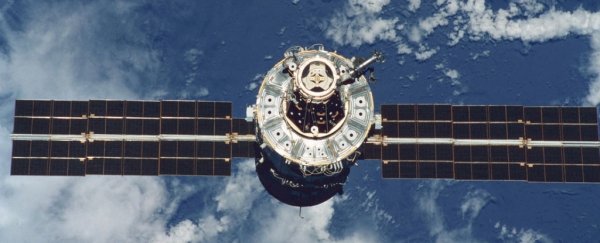Astronauts on board the International Space Station (ISS) rarely get a break from their cramped quarters. Only on occasion do they get to don a spacesuit and actually venture outside. This month, various mission members will get to do so five times.
Over the weekend, NASA began a lengthy series of spacewalks to upgrade a set of batteries on the outside of the ISS. After seven hours outside the orbiting science lab, flight engineers Christina Koch and Andrew Morgan successfully completed the first mission, manually swapping out two nickel-hydrogen batteries for one brand new lithium-ion battery.
"Oh my goodness, it is gorgeous," said Morgan as he exited the ISS in the early hours of the morning. "This is pretty awesome."
Still, there wasn't much time to marvel at the view. Spacewalks are always painstaking, not to mention dangerous. For hours on end, the pair of astronauts had to "inchworm" a bunch of huge fridge-sized batteries to and from a work site on the other side of the ISS.
The P6 electronics assembly, where the new batteries are destined, is too far away for the station's robotic arm to reach, which means the crew must shuffle the batteries from a pallet on the arm all the way there and back.
"The choreography that the crew members have back and forth is very important because they're going to be moving a (new battery) that's about 428 pounds (195 kg) and taking it off of the pallet and moving it out to the integrated equipment assembly," spacewalk flight controller Keith Johnson told CBS News.
"And then they'll take off an old battery, which weighs about 365 pounds (165 kg) and bring that back again."
In microgravity, weight isn't so much an issue, but the mass of these batteries still factors in when it comes to inertia, and this can make the whole process slow and cumbersome.
"You have to use fine motor skills and go very very slowly," explains the spacewalk flight director TJ Creamer. "Moving large objects and massive objects are very doable in space, you just have to be careful and go slowly."

When the ISS was originally launched into orbit in 1998, it was equipped with 48 nickel-hydrogen batteries, split between its four solar wings. When the station dipped into shadow, these batteries were responsible for keeping things going.
After nearly two decades of use, it's about time they got replaced. In 2017, NASA began swapping out these old batteries with 24 smaller lithium-ion power packs, which provide greater storage and power efficiency.
That year and the next, two sets of six batteries were installed; now, in 2019, the ISS is at last getting its third set. The only difference is that now the work site is a lot farther from the station's robotic arms, which helped perform the last two swap-outs.
In fact, the P6 work site is the farthest component from the Station's core modules; it sits on the port side of the outpost.
Over the course of four more missions, astronauts on board the ISS will systematically remove all 12 nickel hydrogen batteries from the P6 and replace them with six lithium-ion batteries.
"We really have to protect how we handle the batteries and how we put the batteries in because there are connections that have to go into the Integrated Electronics Assembly, and they can't be damaged or dented," says Johnson.
"Crew members have to be very careful how they hand off the battery to each other to protect the back end of that box."
 (NASA)
(NASA)
Each of these paired spacewalks will include different combinations of four astronauts, none of whom have performed this manoeuvre before, not even on the ground in training. The necessary materials and procedures have been uploaded however, and they've had plenty of study time.
One of the duos taking on this challenge will include Koch and Jessica Meir, and it will be the first all-female spacewalk, finally taking place after a cancellation earlier this year.
"It has been a wonderful day," said Koch after leading the first seven-hour spacewalk. "I also wanted to say a huge congratulations to the teams across the world that made this day just an awesome day .. For us, it's an honour and a privilege to be a part of your team."
